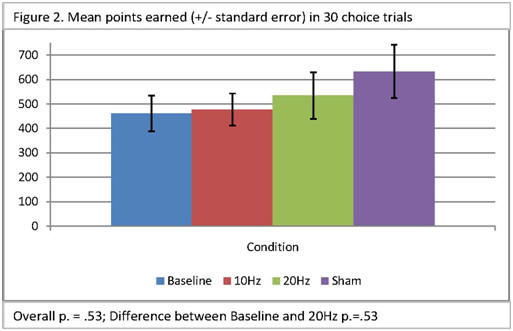Christine E Sheffer, Ph.D.
Addiction is a chronic, relapsing compulsive behavior. Relapse involves the choice of an immediate reward over delayed reward. Similar to other substance users, cigarette smokers tend to prefer smaller immediate rewards over larger rewards received later.1 One session of repetitive transcranial magnetic stimulation (rTMS) applied to the dorsolateral pre-frontal cortex (DLPFC) is known to affect decision-making in simulated gambling tasks and may affect the preference to choose larger delayed rewards as measured by delay discounting tasks.2,3 One session of rTMS also has been shown to temporarily reduce the number of cigarettes smoked immediately after treatment.4 Currently underway, this study is examining the effects of high-frequency rTMS on the propensity to make more conservative decisions and delay reward with non-smokers and smokers. With smokers, the number of cigarettes smoked after stimulation will be examined as well. Twenty smokers and 20 non-smokers, blind to condition, will be assessed at baseline and after 10Hz, 20Hz, and sham rTMS over the DLPFC in a counterbalanced manner. Preliminary results suggest a trend for more conservative decision-making in non-smokers after exposure to 20Hz rTMS.


Figures 1 and 2 show a possible trend whereby those who are stimulated tend to make decisions on the Risky Choice Task more quickly and more conservatively.
Publications
1. Bickel, W.K., Miller, M.L., Yi, R., Kowal, B.P., Lindquist, D.M. & Pitcock, J.A. (2007) Behavioral and neuroeconomics of drug addiction: competing neural systems and temporal discounting processes. Drug Alcohol Depend, 90 Suppl 1, S85-91.
2. Knoch, D. & Fehr, E. (2007) Resisting the power of temptations: the right prefrontal cortex and self-control. Ann N Y Acad Sci, 1104, 123-34.
3. Knoch, D., Gianotti, L.R., Pascual-Leone, A., Treyer, V., Regard, M., Hohmann, M. & Brugger, P. (2006) Disruption of right prefrontal cortex by low-frequency repetitive transcranial magnetic stimulation induces risk-taking behavior. J Neurosci, 26(24), 6469-72.
4. Eichhammer, P., Johann, M., Kharraz, A., Binder, H., Pittrow, D., Wodarz, N. & Hajak, G. (2003) High-frequency repetitive transcranial magnetic stimulation decreases cigarette smoking. J Clin Psychiatry, 64(8), 951-3.
